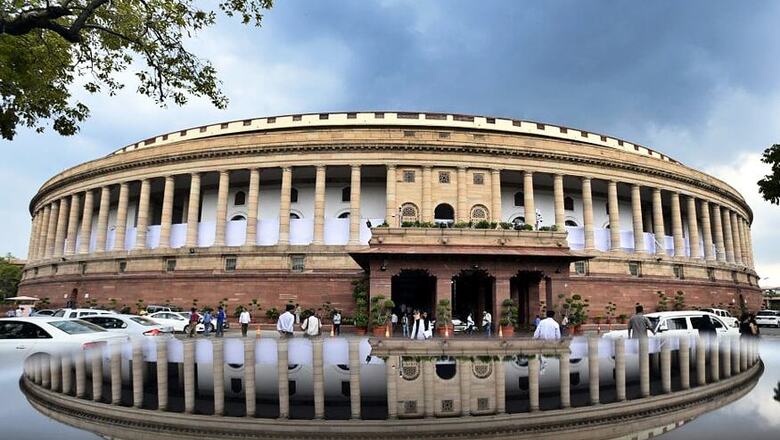
views
New Delhi: Parliament on passed a bill to overturn a Supreme Court order concerning certain safeguards against arrest under the Scheduled Caste and Scheduled Tribe law, with the Rajya Sabha unanimously adopting it amid din.
The Scheduled Castes and the Scheduled Tribes (Prevention of Atrocities) Amendment Bill, which was passed by the Rajya Sabha by a voice vote, had got the nod of the Lok Sabha on August 6.
The bill rules out any provision for anticipatory bail for a person accused of atrocities against SC/STs, notwithstanding any court order.
It provides that no preliminary inquiry will be required for registering a criminal case and an arrest under this law would not be subject to any approval.
The legislation also provides that no preliminary enquiry will be required for registering a criminal case and an arrest under this law would not be subject to any approval.
Replying to the debate on the bill in the Upper House, Minister of Social Justice and Empowerment Thaawar Chand Gehlot said all those who spoke on the bill have supported it.
He said that after the implementation of the law, people belonging to SC/ST communities were able to get justice and relief.
"However, some people went to court due to some reason. On 20 March 2018, Supreme Court gave some decisions which put brakes on the Act implemented by us," he said, referring to the provisions related to filing of FIR and arrest.
"Due to these controls, the criminals started getting protection and the affected families stopped getting justice and relief," Gehlot said.
The minister said there was also scope of interference in the police procedures and therefore the government filed a review petition, which was accepted.
He said the members have expressed some apprehensions about the rights of the deprived classes. "Prime Minister Narendra Modi has assured his government's commitment towards (the interests of) backward classes. I today say that we are committed towards safeguarding their interest."
"Some members have suggested constitution of special courts for the Act. We have made a provision for this in the bill. As many as 14 states have constituted 195 special courts for deciding cases related to SC and SC Act. Some states have declared District and Session Courts as special court for the purpose," he said.
Elaborating on the bill, he said "we have provided for presenting a challan in the court within two months of first information report with complete investigation. We have also provided for disposal of the case with two month of presenting challan in the court."
The minister also maintained that the amendment in this bill was not brought due to "any pressure" because it was the Prime Minister's commitment.
During the debate, some members were of the view that the government has brought amendment bill under pressure from the opposition and coalition partners ahead of proposed nationwide protest later this month to demand restoration of the provisions of the law which, the Dalit groups allege, were diluted by a Supreme Court ruling of March 20.
These groups have been asking the government to overturn a Supreme Court ruling of March 20, saying it had "diluted" and rendered "toothless" the law against atrocities faced by the weakest sections of the society by putting additional safeguards against arrest of the accused.
Supporting the bill, Abir Ranjan Biswas (Cong) said "we are supporting the bill but the genuinity of feelings of the government are fake. They have brought the bill only after 9 people were killed and many injured in a nation wide protest against Supreme Court judgment."
He alleged that the government brought the bill due to pressure of the opposition and its coalition partners. He also said the conviction rate in cases of atrocities against SCs was 1.4 per cent and in case of STs, it was 0.8 per cent.
Sarojini Hembram (BJD) also supported the bill saying all the ministries of law, social justice and law should coordinate properly to implement the law.
Ram Chandra Prasad Singh (JD-U) too supported it but suggested that the cases should be investigated by an officer of DSP and above level, while K Keshava Rao (TRS) said this law will again be challenged in the court.
K Somaprasad (CPI-M) supported the bill and said that the apex court judgment had diluted the law, while Manoj Kumar Jha (RJD) said the government could have brought an ordinance to overturn the judgment.
Kumari Selja (Cong) accused the government of not being 'pro-Dalit" and said otherwise, it would have brought the law under the Ninth Schedule.
She alleged that every 15 minutes, a crime was committed against Dalits and atrocities against them have been rising even as the conviction rate was low in such cases.
Selja also alleged that the government had rewarded the Supreme Court judge who delivered the judgement (diluting the provisions of the SC/ST Act) by appointing him Chairman of a crucial tribunal after retirement.
Kirodi Lal Meena (BJP) claimed that the Supreme Court crossed its 'Lakshman Rekha' on the issue.
He objected to the collegium system, saying it promoted casteism and dynasty and called it "unconstitutional".
Meena demanded that the collegium system should be abolished and replaced by the Indian Judicial Sevice so that SC/ST and other backward communities get an opportunity to occupy higher positions in courts.
He also urged the government to seriously consider introducing the Indian Judicial Services.
As Meena started naming opposition-ruled states where atrocities against SC/ST communities have taken place oin the recent past, members from the opposition objected noisily.
Amid the disruptions, Chairman M Venkaiah Naidu adjourned the House for ten minutes till 2:43 PM.
Later, Ram Gopal Yadav (SP) supported the bill and said it seemed as if the Supreme Court has become the third chamber of Parliament as it was framing legislations.
Vijila Sathyananth (AIADMK) said the conviction rate under the SC/ST Act was low at just 15 per cent as per the National Crime Records Bureau. She said a comprehensive anti- discrimination law was needed as crimes against SC/ST are manifested in various forms like social boycott.
Rajaram (BSP), Narendra Jadhav (nominated), Sanjay Raut (Shiv Sena), V Vijaysai Reddy (YSRCP), D Raja (CPI), Ram Kumar Kashyap (ind) and Wansuk Syiem (Cong) also supported the measure.
















Comments
0 comment